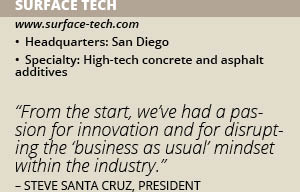Surface Tech: Innovating Concrete and Asphalt for the Future
Surface Tech brings the future of asphalt and concrete to today’s applications.
Contractors and design engineers want concrete and asphalt applications that can withstand heavy loads and harsh environmental conditions. Various products have attempted to improve the durability and service life of asphalt and concrete, but reliability and scalability have had mixed results. Until now.
Surface Tech approached these challenges utilizing scientific research and development methods and has succeeded in bringing effective technologies to the construction marketplace.
These products, plus Surface Tech’s commitment to advanced dosing and support technology, are proving that the future of asphalt and concrete has arrived.
Passion for Innovation
Surface Tech was founded in 2013 with a single-minded purpose: Bring new technologies to the construction industry. “From the start, we’ve had a passion for innovation and for disrupting the ‘business as usual’ mindset within the industry,” President Steve Santa Cruz explains. “Our foray into research-based solutions laid the groundwork for how we would approach the development of new, highly technical products and services.”
ACE XP Polymer Fiber
Making asphalt as strong as steel – In 2013, the company debuted its high-performance ACE XP Polymer Fiber product. Early on, Surface Tech recognized the superior advantages that para-aramid fibers could provide to asphalt applications.
These polymer synthetic fibers provide strength and flexibility benefits that make them ideal for a wide range of products, including for armor, airplane wings and undersea pipelines.
To create ACE XP, high-strength aramid fibers are bundled and coated with Sasobit® wax that mixes easily with any WMA or HMA in both drum and batch operations. ACE XP’s micro-root tendrils tenaciously anchor into the asphalt binder, providing 400,000 psi tensile strength and three-dimensional reinforcement to the hot mix. The extra reinforcement expands the mixture’s ability to resist rutting better while also improving crack resistance, resulting in a dramatic improvement in life expectancy.
ACE XP is a dry form polymer, making it less expensive, more reliable and easier to adopt than wet polymers. Surface Tech custom-designed its MD3 machine dosing system to ensure an easy, metered process to introduce ACE XP into any asphalt mixture. Requiring only compressed air and a 110-volt electric source to operate, the MD3 will dose both 3/4 (19mm) and 1.5-inch (38mm) fibers in U.S. and metric tonnage rates.
The ultimate beauty to ACE XP is its scalability and batch-to-batch reliability. Combined with ease-of-use, it is a proven way to armor asphalt for the long haul. In fact, ACE XP continues to engage in rigorous performance testing by leading labs and universities. Findings can be obtained by downloading ACE XP Polymer Fiber’s Tech Brief on Surface Tech’s website.
“ACE XP Polymer Fiber is one of the few products that improves both the high- and low-temperature properties of the asphalt mixture,” says Phil Blankenship, P.E., a strategic advisor to Surface Tech. Meanwhile, ACE XP is rapidly gaining acceptance and adoption throughout the asphalt industry because it delivers huge performance advancements for a relatively low cost.
JUNO XP
Improving concrete at the microscopic level – Soon after developing ACE XP, company leaders turned their attention to concrete. There they applied cutting-edge research into mineralogy to develop JUNO XP, an alternative supplementary cementitious material (ASCM). The team also developed TRKR for the concrete industry, a smart online sales and marketing platform to manage ordering, invoicing, tracking, compliance and more.
Because Portland cement consumes vast quantities of energy and releases CO2 in the process, the construction industry faces increasing pressure to find ways to replace or enhance Portland cement in concrete. Concrete mixes already incorporate supplementary cementitious materials, including fly ash and silica. However, these materials do not address all of the shortcomings of Portland cement in certain applications and environments, and fly ash is becoming scarce and less reliable for intended performance purposes.
JUNO XP is an advanced mineral and pozzolan supplement that serves as a partial substitute for traditional binders. It can be used in standard concretes, as well as in specialty applications – without sacrificing their performance. The core technology found in JUNO XP applies revolutionary advancements in mineralogy and pozzolanic applications to increase resistance to physical and chemical attack, like alkaline silica reactivity, without sacrificing performance and resulting in a graduated fiber matrix to reduce material cost.
“JUNO XP is a dry alternative supplementary cementitious material that is scalable, consistent and easy to adopt,” says Jon Belkowitz, the company’s chief technical officer. In concert with Intelligent Concrete LLC, Belkowitz led the research effort to develop JUNO XP.
“It significantly reduces drying shrinkage that leads to cracking, and it adds strength to concrete pavement, structures and infrastructure throughout the concrete placement,” he notes.
As an alternative supplementary cementitious material, JUNO XP can mitigate many of the problems inherent with traditional alternative supplementary cementitious materials. It can reduce the cost of a concrete project and reduce the carbon footprint.
Future Innovation and Evolution
With its history of successfully introducing highly technical products, Surface Tech displays a unique ability to forge ahead through scientific discipline and rigorous testing to uncover successful product development breakthroughs.
“Surface Tech seeks to revolutionize our construction and maintenance industries by finding ways to make building materials better, stronger and longer lasting,” Santa Cruz says. “We understand the evolution of construction projects, and our goal is to continue to develop holistic solutions to address the exact needs of owners, engineers and contractors through the development of relevant product and service offerings.”